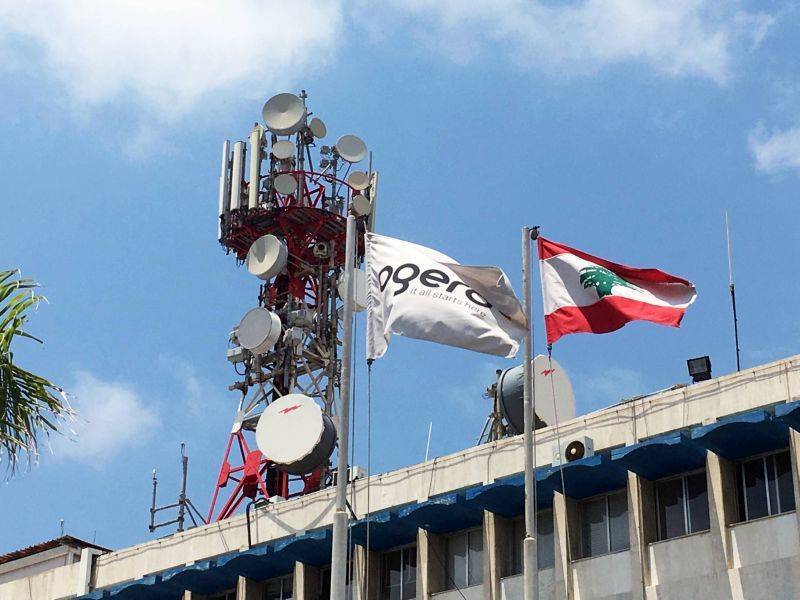
Ogero’s headquarters in Beirut. (Credit: Philippe Hage Boutros/OLJ)
BEIRUT — In its final meeting before it is officially considered to be resigned, Lebanon’s cabinet on Friday afternoon agreed to increase telecom tariffs and approved the government’s economic rescue plan.
During the meeting at the Presidential Palace in Baabda, the cabinet decided to increase the telecom tariffs for Ogero, Alfa and MTC starting in July, Information Minister Ziad Mkari announced.
The new rate will be the equivalent of the bill divided by three and then multiplied by the Sayrafa rate, currently set at LL23,900. This means that a $100 invoice, equivalent to LL150,000 when calculated at the official rate of LL1,500 per US dollar, will increase to LL796,667 (about $25 when calculated at the current parallel market rate). A committee will be formed to study the plans that would be offered at the new rate.
Telecom Minister Johnny Corm had held a press conference on Thursday where he asked the cabinet to approve tariff increase for Ogero and telecom operators and threatened to resign if the proposals were not approved. On Friday, more than 50 employees of the phone operators in Alfa and MTC Touch held a general strike to demand better living conditions.
Following Friday’s meeting, Corm told L’Orient Today that with the new tariffs, revenues in the sector are expected to grow to $350 million per year from the current $70 million, and with costs at $295 million, the sector will rebound from a loss of $225 million to a profit of around $50 million. The $295 million includes $40 million in Capex , which means that the ministry will have an extra $50 million to upgrade the infrastructure. He also said that officials anticipate that about 26 percent of telecoms customers would drop their service at the new rates.
Youth and Sports Minister George Kallas called the new rates “the most expensive bill in the world for the poorest people in the world.”
The government’s economic plan, a copy of which was obtained by L’Orient Today, states that the financial losses of the banking sector exceed $70 billion. As part of its plan, the government is planning to restructure Banque du Liban and the banking sector generally, including dissolving banks deemed to be insolvent and making governance reforms at the central bank. It then aims to recapitalize the central bank. The plan also includes passing a capital control law and amending the banking secrecy law. The plan would also aim to unify exchange rates, restructure the country’s foreign debt and cap the budget deficit at 9 to 10 percent of GDP.
In a previous version of the document, deposits up to $100,000 that were deposited by March 31, 2022 were to be guaranteed. Any increase in the deposit’s balance after this date would not be guaranteed. Balances above the $100,000 limit will either be converted into shares in banks, partially written off and partially converted to Lebanese lira at a different rate than that of the parallel market.
The plan passed by the cabinet does not include any figure regarding the amount of deposits that would be protected, only noting that it would protect small depositors “to the maximum extent possible” for banks deemed to be solvent, while for depositors at insolvent banks there is no guarantee.
The information minister said that those who voted against the plan are Public Works Minister Ali Hamieh, Agriculture Minister Abbas Haj Hassan, Labor Minister Moustafa Bayram, Culture Minister Mohamad Mortada while Education Minister Abbas Halabi reserved his vote.
The government did not approve an increase in the customs tariffs, which was also on its agenda.
As activists, including patients with cancer and chronic illnesses, protested medicine shortages and called for funding to be allocated for the import of drugs, the government decided to pay $35 million per month for the upcoming four months to buy medicine and medical supplies for cancer and chronic diseases patients, as well as infant milk and products to manufacture drugs.
Health Minister Firas Abiad told L’Orient Today’s correspondent at the Grand Serail that the money will be funded from the Special Drawing Rights given to Lebanon by the International Monetary Fund in August 2021. The government also accepted a French donation of night scanners which will be used at the Beirut port. Hamieh said that the scanners would have cost the Lebanese government $16 million.
During the meeting, President Michel Aoun said that “the [parliamentary] elections were done in acceptable conditions in spite of some incidents,” the Presidency's twitter account reported.